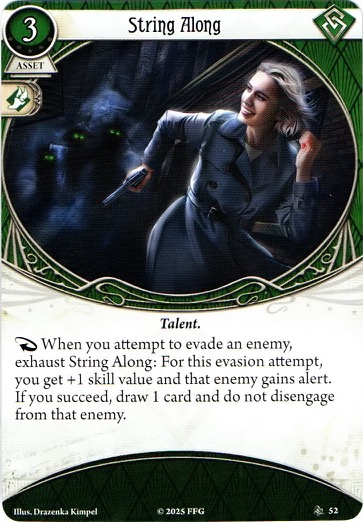Heartbreaking realization: String Along doesn't have the Trick trait, meaning that Rita Young can't take it. Granted, this isn't the end of the world, Rita's been on a winning streak the last few expansions (Dirty Fighting, Trick to the Plan, Lightfooted), but still, put it in the "Would be Amazing if Rita got Access to it" pile with Pickpocketing, Backstab, and Thieves' Kit.
Apoyo
Talento.
Coste: 3.
Cuando intentes evitar a un Enemigo, agota el Vacile: Para este intento de evitar, recibes +1 a tu valor de habilidad y ese Enemigo obtiene Alerta. Si tienes éxito, roba 1 carta y no dejes de estar enfrentado a ese Enemigo.

FAQs
No faqs yet for this card.
Reviews
This card should be a good addition to an evasion build, as its core strength is that it can combo with evasion events and assets to boost the test and add a card draw. This helps with succeed by 2, and especially good if you are trying to drag an enemy around to locations with clues.
Some particularly good in-class card combos to try:
Looking forward to testing this out in an upcoming || Jenny Barnes run.
I wonder how this interacts with Stealth. When you trigger the reaction here you have basically one card that tells you "do" and another one that tells you "do not" for the same effect. Neither card has the wording "cannot" (for this effect), so they have the same priority.
Grim Interpretation: You get +1 and the card draw from the successful evasion, but neither do you disengage from the enemy, nor does it exhaust. Why would you do that? To trigger Delilah O'Rourke in one of the player windows during the skill test and to draw a card.
Reasonable Interpretation: "do not" does not force you to do something, you are just not doing it. So when String Along tells you not to disengage, you don't, but since Stealth tells you to disengage, you eventually do.
Chill Interpretation: Two contradicting effects with the same timing - if the game doesn't choose for you, simply do it yourself. If you want to disengage, do, if you don't, don't. Backed by the Silver Rule: arkhamdb.com
Let the hate flow through you in the comments!
EDIT
I have added a link to the Silver Rule: arkhamdb.com to the Chill Interpretation, which might actually be the answer.
Probably Intended Interpretation: Although it is not (reminder text) (see Kicking the Hornet's Nest, for example), they could have omitted the "disengage with it" clause from Stealth without changing the card, since disengaging from an enemy is the default effect of a successful evade. Therefore, you could argue for the Grim Interpretation and Piegura's comment. The Golden Rules (https://arkhamdb.com/rules#The_Golden_Rules) is also in favor of this interpretation.